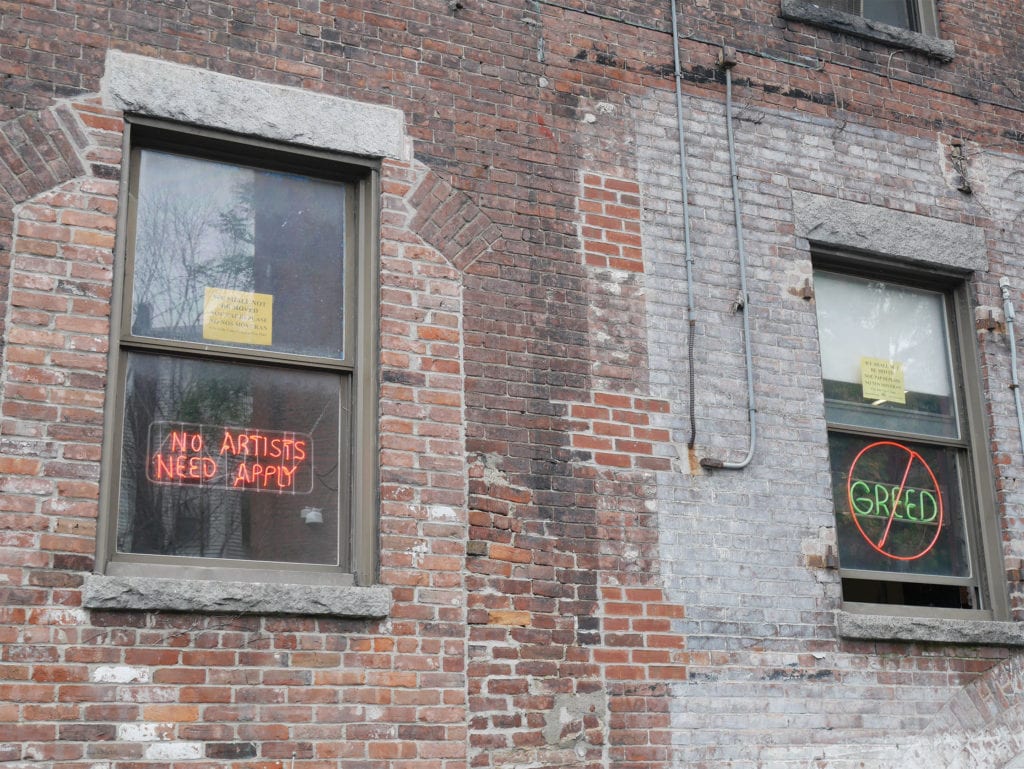South End artists fight eviction from historic cultural home
Residents of Piano Craft Guild want to negotiate, as displacement of artists continues across city

Neon signs declaring the Piano Craft Guild apartment block and studio space on Tremont Street an “art free zone” hint at the uncertain future remaining artist residents face.
“It’s about all I can do,” said international artist, long-term Piano Craft Guild resident and organizer of this neon protest, Wayne Strattman. He and fellow artists Peter Lipsitt and Ekua Holmes are the last three artists with work spaces in the building’s commercial wing that management plans to transform into luxury apartments when the artists’ leases expire in January 2019.
“These are all people who have supported the community for over 40 years,” said Strattman, the de facto leader of the group fighting displacement, whose life’s work has involved luminescent light displays, some of which have made their way onto the sets of blockbuster movies such as “Star Trek: The Next Generation,” and “First Contact.”
Artistic legacy
The converted piano factory was designed as a home and workspace for artists in the 1970s, and despite a brief period in the 1990s when building management tried to evict artists for the first time, it has remained a creative hub in the heart of Boston’s South End.
But now, of the 176 apartments managed by The Shoreline Corp. only 20 are occupied by artists, and for this diminishing group, few workspaces remain in the building.
Their displacement “has completely changed the culture of the artists community in the South End,” said Roxanne Anderson, an organizer with community group City Life/Vida Urbana, which is helping Strattman and other residents pressure building management to come to the negotiation table.
“These artists have cultivated the value of their property,” said Anderson, pointing to the fact that many of them have paid market-rate rent for the past four decades, “and now their needs are not being met.”
Stalled negotiations
Since eviction letters arrived in November last year, Anderson said the artists have tried to co-operate with building management but have been met only with disrespect. Strattman said they have tried softening their demands and have suggested potential solutions, but so far management seems uninterested in negotiating with them.
“These folks just really want the issue to go away and for things to be settled privately behind closed doors,” said Anderson. Another artist and resident, Paul Goodnight, was part of the protest until building management made him a deal that included alternative studio space and payment for relocation costs, an offer that also came with a gag order preventing him from speaking publicly about the matter, Strattman said. This offer has not been extended to the other artists facing eviction.
Strattman said if a relocation package was proposed he would take it, because moving costs are high and rising property prices often prohibit artists from finding similar centrally located studio space in the city. According to data from the Boston’s arts and culture department, 89 percent of the city’s certified artists earn less than $60,00 a year, making $30,000 in moving fees, as Strattman said he was quoted, virtually impossible to pay.
“Artists are adding cultural value to our city,” said Anderson, “but they are not always the wealthiest folks. … This doesn’t mean we should not protect their rights just because the market is changing.”
With so few of them left to challenge the eviction notice, Strattman believes their weakened presence might be why management have chosen to strike now, besides the obvious financial incentives of redevelopment.
Citywide issue
The evictions on Tremont Street are representative of citywide displacement issues, said Anderson. At 128 Brookline Ave, 15 artists have been evicted, while members of Northeastern University’s affiliated African American Master Artists in Residence Program continue to clash with university officials over the future of their workspace at 76 Atherton St. It would seem artist communities aren’t safe over in Cambridge either, following the eviction of 200 musicians from the EMF building on Brookline Street in June. Anderson called this “a gentrification and displacement crisis.”
Piano Craft Guild building management was contacted but had not responded to a request for comment at time of publication.
Besides neon proclamations, the small group of artists, with support from City Life/Vida Urbana, launched an online petition on Monday, to gather support for their cause and put pressure on building management to allow them to keep their workspaces beyond the new year. Community organizers will also send a public letter this week to The Shoreline Corp., with city councilors included on the communication, asking for negotiations in the coming months.
“As a city that wants to commit to being a cultural hub, we need to take a stand against the displacement of artists … and honor their legacy and impact,” said Anderson.






